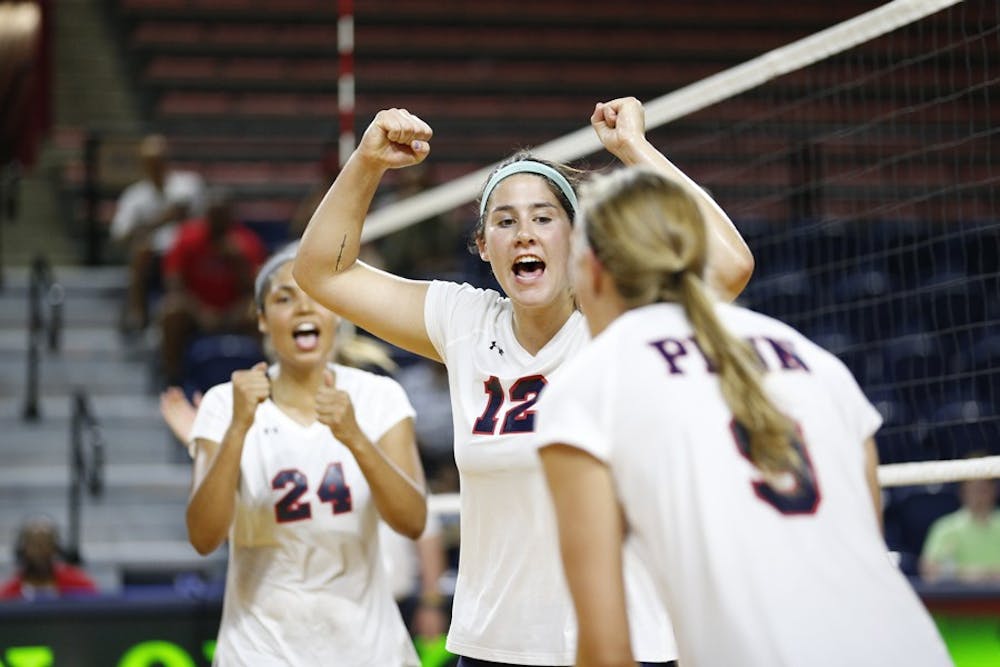
Winning means more than match points for the Penn volleyball team .
The Quakers lost three close showdowns to highly-ranked teams at the Stanford Invitational in California this past weekend, yet the athletes developed chemistry that made the cross country campaign a success.
“That team chemistry is a big part of our team, probably the biggest part of this team and our program,” senior right setter Trina Ohms said. “We all love being together. Whether it’s road trips, singing along to a boombox or warming up and giggling, it’s always full of smiles.”
Squaring off against Santa Clara, No. 1 Stanford and No. 20 Duke, Penn faced stout competition on the West Coast. Despite an All-Tournament performance by junior outside hitter Alexis Genske, the Red and Blue’s record dropped to 2-5. Losing each set by an average margin of about six points, the Quakers performed well against the national powerhouses, showing many flashes of offensive dominance.
However, what was impressive about the Quakers’ performance was not simply what they did, but how they did it. Pitted against top athletes, Penn chose mind over matter and controlled the emotional atmosphere of each match.
“If we had a good pass, good set, then got blocked on the hit, we focused on the first two steps of the process,” coach Kerry Carr said. “We were celebrating even though we lost the point. All of that energy translated into points for us.”
Facilitated by an incredible on-court morale paired with the Ivy League’s most spirited bench, the Quakers posed a steep mental threat to opponents. Empowered by this advantage, the Red and Blue tied top-ranked Stanford at 19 different points in their match and won a tough 26-24 first set against Duke.
“We wore the other team down emotionally, which I think was about half the battle in the Stanford match,” Carr said. “Learning those types of strategies ... was a really big step for us.”
Penn also ironically found home court advantage in California, as Carr observed that “our crowds were bigger” than those of the California universities. With eight members hailing from the Golden State, the Penn squad was heavily supported by parents and alumni.
“[About] half our team is from California,” Ohms said. “I think a lot of the team was so grateful and appreciative for this opportunity.”
Along with their chemistry, the Quakers’ sense of accountability continued to grow throughout the tournament. As a team with fewer than five seniors for the second straight year, leadership is a shared responsibility for the Quakers. While the three captains — senior setters Meghan Connolly and Ohms along with junior Genske — head the squad on and off the court, each teammate plays an important role in spearheading the group’s progress.
“It’s not a couple of individual leaders, it’s really a solid group,” Carr, the Quakers’ coach of 16 seasons, said. “Trina, Alexis and Megan are the captains, but the whole senior class ... does a great job leading. Some people lead at different times. I think that’s a really good thing for us.”
The Penn squad will lean on this revitalized chemistry as it enters an important weekend at the Palestra — the Big 5 Tournament. Slated to face regional foes Villanova, La Salle and Temple, the Quakers return to the East Coast to defeat their neighbors as both a stronger team and stronger teammates.
The Daily Pennsylvanian is an independent, student-run newspaper. Please consider making a donation to support the coverage that shapes the University. Your generosity ensures a future of strong journalism at Penn.
DonatePlease note All comments are eligible for publication in The Daily Pennsylvanian.





